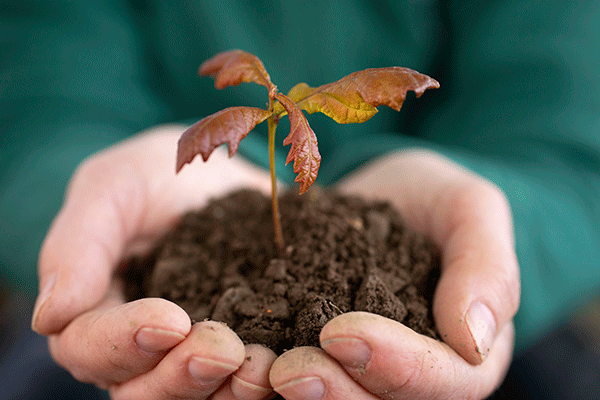Researchers are planting 28,000 trees in Wales under a new large-scale trial to investigate how to speed up carbon capture through natural solutions.
The trial, in Camarthenshire, will test two methods including adding soil from already established forests, as microorganisms and complex networks of fungi in healthy forest soil are known to improve the growth of trees. A second method will add basalt, a mining by-product that reacts with C02 in the air and could speed up the storage of carbon in trees and soil.
Run by new climate charity The Carbon Community, in partnership with the University of Sheffield, The Grantham Institute and The Crowther Lab among others, the trial will use plantings of Welsh mixed broadleaf trees, and monoculture conifers, typical of commercial plantations, over a total of 28 acres.

Senior scientist Dr Colin Averill said: “Studies continue to find that introduction of native soil communities can dramatically increase plant survival. How these fungi may in turn affect tree seedling growth and survival rates and ecosystem carbon sequestration at scale remains unknown.”
Professor David Beerling, of the University of Sheffield, said: “Our recent research revealed that applying basalt to croplands could absorb up to two billion tonnes of CO2 from the atmosphere.
“This exciting new partnership with The Carbon Community enables us to understand basalt addition in a reforestation project.”
Planting trees on farmland is seen as a crucial way to mitigate climate change as trees draw down carbon from the atmosphere and lock it into soil. In addition to storing carbon, trees also provide ecosystem services such as increased biodiversity. But both of these only take place if trees are established and have enough nutrients.

“Reforestation is one of the most powerful tools we have to combat climate breakdown, much of which will happen on agricultural land,” said co-founder of The Carbon Community, Charles Nicholls. “Intensively farmed land is often stripped of the native biodiversity and minerals needed for optimal tree establishment.”
With climate talks COP26 happening this November, there is a huge national drive to plant trees to fight climate change and offset emissions.
But as a recent Wicked Leeks short film emphasised, maintaining healthy forests and trees requires expert skills and knowledge if they are to reach their carbon storage potential and preserve biodiversity.















Please keep us up to date with progress on this plus advice on how to get local tree plantings off to a flying CO2 efficient start. Thanks